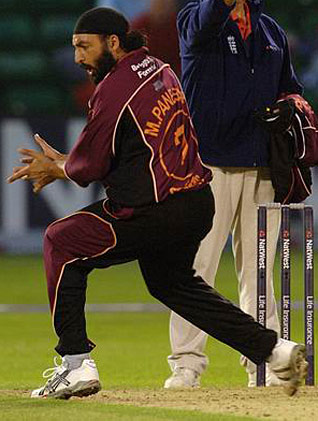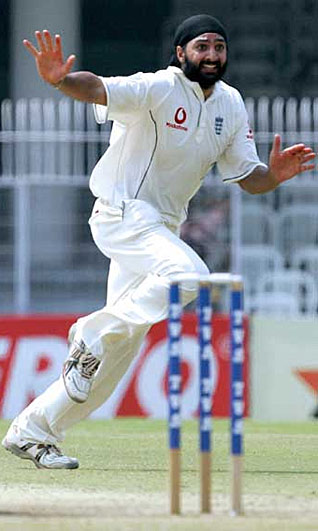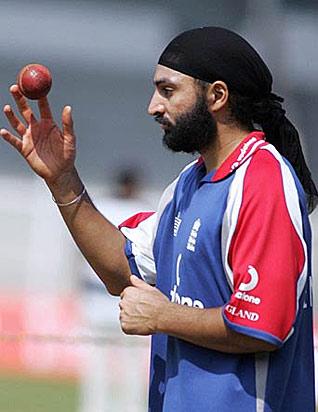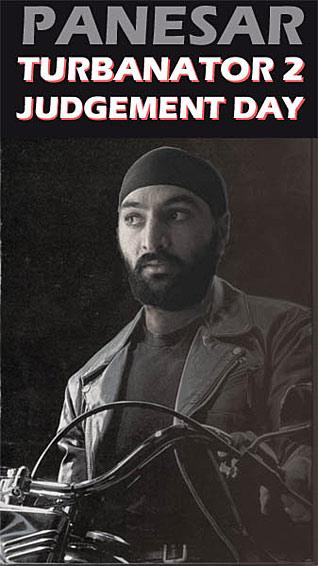Sports
England's Dreamer
by ROBERT CRAMPTON
In the Test match which started in Manchester the day after we met, Monty Panesar took ten West Indian wickets, winning the match for his country and bolstering the view that he is one of the best players in world cricket and the best English spinner since Derek "Deadly Underpants" Underwood in the 70s. That performance also helped Monty win the English "Man of the Series" award. Maybe he should do interviews more often.
Or maybe not. He is, as I discovered in our two hours together in the team hotel, a friendly, seemingly uncomplicated young man. But he is not very forthcoming.
Reserved, modest, Monty is softly spoken to the point of inaudibility, the polar opposite of Kevin Pietersen, the other star performer in the current team. When he has to change shirts during the photo shoot, Monty goes off into a corner and turns his broad back (at 5 ft.11, he's a muscular 13½ stone) to the room. Unlike Pietersen, this is a man without a trace of vanity. It is hard to imagine anyone not liking him.
Because of his exuberant wicket-taking celebrations, and perhaps, too, because he is a Sikh, the first Sikh to play international cricket for a country other than India, Monty is assumed to be a character, an extrovert, an exotic.
But he isn't any of those things.
He's "a working-class lad from Luton". Take away the patka, the minimised version of the full Sikh turban, and the unshaven, indeed never shaven, face, and what you have left is a typical 25-year-old sportsman, all focus and fitness, sponsored VW Touareg, Friends and The Simpsons, R&B and a game of snooker, thrillers and sporting biographies.
"The Sikh mentality", he says more than once, "is that it's important to integrate". And it seems to me he has integrated very well.
The most interesting thing about Monty is not his ethnicity, but his ethic. His work ethic. He has triumphed over adversity, but it hasn't been the adversity of prejudice, rather the even more serious disadvantage of being desperate to excel in a sport for which he had precious little natural talent.
He is not, to put it mildly, a naturally gifted athlete. He remembers boys in his early teams as "having a great natural action, or being a great natural striker of the ball". He was not among them.
"I was flat-footed", he says, "the way I would run and field, my team-mates called me Edward Scissorhands. They found it amusing, and so did I. All I had was passion. Even my bowling action isn't natural. I've bowled bowled bowled to make it natural".
When he first got into the England team during last year's tour of India, Monty's fielding (and his batting) let him down. Early on in his career, he dropped an easy catch. Actually, not so much dropped as didn't get within yards of.
He chuckles. "Even in training I hadn't dropped a catch like that, then to drop the worst ever catch in front of the whole world, I was embarrassed, and also determined it wasn't going to happen again". After a lot of running and pilates and "speed and agility work" in the gym, his fielding is now much improved.
Still, Monty's early incompetence had one beneficial side effect: it helped turn him into a cult hero among the travelling England fans, the so-called Barmy Army, who began wearing patkas and fake beards in honour of their new idol.
As with the chubby Paul Gascoigne, here was a young man ordinary fans could relate to. "Yeah, that's why people cheer me", he says, "I'm this guy who looks like he's just off a council estate. I wasn't trained to be, y'know, an elite athlete. I was a guy playing in the park, on a normal piece of grass, trying to play for England".
The patkas and fake beards don't bother him. "It doesn't offend me at all".
Does anything offend him? He has a long think about that, stares out of the window at the Salford skyline for inspiration. No, he can't come up with anything. Doesn't he ever get depressed?
"I think that's where being a Sikh helps me".
Why? Don't Sikhs get depressed?
"Obviously", he says calmly, "we're all human". So what does your religion say about depression? "You follow your Guru, you believe in the faith, it's like a blind faith. Today hasn't gone well, tomorrow will go well. Cricket's like that. Some days you may not do well, but tomorrow is another day".
He is, he says, proud of being a Sikh. He goes to the gurdwara once a month or so. "I follow the basics", he says. He does not, contrary to some reports, maintain the tradition of keeping a comb or a symbolic kirpan in his patka.
He has visited the Punjab maybe half a dozen times, "Lovely place, good to see where the Sikh people are from". He speaks Punjabi fluently. "We spoke Punjabi and English at home, sometimes both mixed in the same sentence".
He is vegetarian, he says, and a teetotaler, but not because of religion, "It's just not my cup of tea". When he's out socializing with the team, and they're on the beer, what does he think? "I try to join in the banter. It's fun, it's good. I don't like to make judgments".
He is single, he says, rather evasively, and then adds he doesn't want to talk about it.
Will he have an arranged marriage? "Some people do, some don't. When that time comes, we'll see". But there's not a girl lined up for him in the Punjab? "What?" he laughs, "just waiting there like a wife in a barrel? And I'll just go there and say, ‘There she is?' No mate, that's not the case".
He does not see himself, he says, or want to be seen, as a role model, for Sikhs or British Asians or anyone else. "I see myself as a guy who likes playing cricket".
Monty (full name Mudhsuden Singh Panesar) is the eldest of three children. His parents came to England, separately, from India in the late 70s, originally to work for a few years before returning home. "They met each other and gradually settled. It's like English people going to Australia or South Africa". Some go for a while, some emigrate permanently.
His father was, still is, a builder, trained as a carpenter. His mother works "putting garments together" in a factory. Home was a "normal terrace". Monty and his siblings went to Stopsley High, the local comprehensive. It is a close family. Monty has only recently moved out of the family home in Luton into his own flat in Northampton.
"My parents both worked very hard", he says. "Maybe that's where my working hard comes from". Were they very ambitious for their children? "They wanted their kids to be happy. They valued education. It was always in our minds if we get some results they'll be happy. They were ‘be with your mates, do everything like other British kids do', but obviously, seeing your parents work hard, you want to make them feel proud, don't you?"
Monty was a popular kid at school, becoming more so once his cricket took off. "And my Sikh identity meant there was more of an interest in me". It's often assumed, I say, if you're from an ethnic minority that you must have had bad experiences as a result, but you're saying the opposite? "Yes. At school, in teams, they'd ask about my background and they'd be interested".
So it was never a burden, being a Sikh? "Not really". Ever suffer from racism? "No". Never? "No". Not once? "No. From a young age, I was taught to integrate with everyone". What about some idiot shouting something from a car? "You get the odd comments here and there, you get that anywhere really, don't you?"
He had "a tight group of friends, a bit of everything [in terms of race], all working class. Most of them have gone on to become doctors". Academically, "we all helped each other out. We weren't like geeks, we blended in, but we had studied together. Individually, I couldn't have done it".
He preferred science to arts, gaining three Bs in A level Maths, Physics and Chemistry. "I wouldn't say I'm clever", he says, "I'm a nobody". You're not a nobody, I say. He laughs. You mean you're in the middle? "Yeah. You've got to try your best".
By the sixth form, Monty had moved to a different school, having been offered a sports scholarship to Bedford, a public school. "My friends were very upset, they said ‘don't go'". But he did.
"It was great, but it was another world. You had to wear a blazer, some people had laptops, they used a higher vocabulary, had different accents, it was like, ‘Wow! People like this exist in the world!'" So, when he says, "I didn't have the resources or the coaching of someone who's gone to a very good school", it isn't quite true. Not quite.
The cricket coach at Bedford School until recently was Derek Randall, who won 47 caps for England. With his customary ease, young Monty fitted in. He likes being one of the lads.
"I really enjoy the dressing-room atmosphere, seeing your team-mates work hard and feeling happy for them when they do well".
The reason he was offered the scholarship was because he'd been scouted by Northants, and the reason they'd taken an interest was because at around fifteen, he gave up trying to bowl fast, and turned to spin instead. Up until then, "it was just a hope. I was just living on a hope, going to the park every day, training".
The hope he was living on was that he might one day play for England. Always England, never India? "I was always England".
This, despite the fact that his hero was Sachin Tendulkar, the most famous man in his parents' country, the David Beckham of the sub-continent. Fittingly, Tendulkar became Monty's first Test victim on England's tour to India in 2006. (Tendulkar will face Monty again in the Test series starting in mid-July, 2007.)
Did he get a hard time from the locals? "No, they were very happy a Sikh guy had got into the England team, they got really excited".
Back as a fifteen-year-old, Monty couldn't spin the ball at first (spin bowling is the most arcane of the cricketing arts), but "it became an obsession, I just wanted to bowl loads" and fairly soon "it was like, wow! it's turning a lot". For the uninitiated, spin bowling relies, for its potency, primarily on the degree of deviation the bowler can impart to the ball.
Monty can impart a great deal, not least, one imagines, because his hands are enormous. "Yeah, maybe it helps", he says, surveying his massive digits, "got to get that index finger down on the ball and give it a right good tweak".
His expression changes when talking about his trade, becoming more animated as he describes the variations of pace, flight and angle a spinner must develop, all the while trying to bluff and double-bluff the batsman into thinking the ball is going to bounce in one direction when it's actually going to go in another.
"It's all about feel", he says, turning almost mystical, "that's why I bowl and bowl, I need to feel it, feel that touch, that feel-touch, and stay fluid, stay relaxed, stay smooth." Right, I say. "You know carpet?" he asks abruptly. Yeah, I say, I know carpet. "If you tense that roll, it's not going to be a smooth roll, is it?" No, I agree, it's not. "Got to be smooth", says Monty.
Once he took up spin, Monty was on his way.
After A levels, he did a year at Loughborough University. "I bulked up quite a bit there, did a lot of power training, went overboard. I got addicted. You lift 100 kg., you think, ‘I'm gonna do 120, 140', next thing I'm doing 180, silly weights, thinking, ‘Jesus, where's this come from?' My first coach used to tell me, ‘You've got some sort of craze in your mind, I told you to do weight training and you go to the extreme of lifting weights you're not supposed to lift; I tell you to bowl, you bowl all day.'"
He trained even when there was snow on the ground. "I didn't", says Monty, "have someone say, ‘That's not good for you'. It was an obsession. And I was enjoying it. I thought, if I bowl six hours today, I'm gonna get better." And as things turned out, he was spot-on.
He did get better, an awful lot better, with much more to come. He may not want to be a role model, but I think he makes a rather good one.
[Courtesy: The Times, London, England]
Conversation about this article
1: Bakhsish Singh (Brampton, Canada), July 09, 2007, 1:23 AM.
Indeed, Monty is a role model for all youngsters of any ilk. But particularly so for yong Sikhs, because of his saabat surat and his clean lifestyle.
2: Manjot Singh (U.K.), July 11, 2007, 2:25 PM.
Monty is a great role model for Sikhs of all ages. We look forward to having many more like him, holding high the flag of Sikhi.
3: Navjeevan Singh (India), July 20, 2007, 12:57 PM.
What I particularly like about Monty is that he has achieved all of this while practicing his Faith fully.






